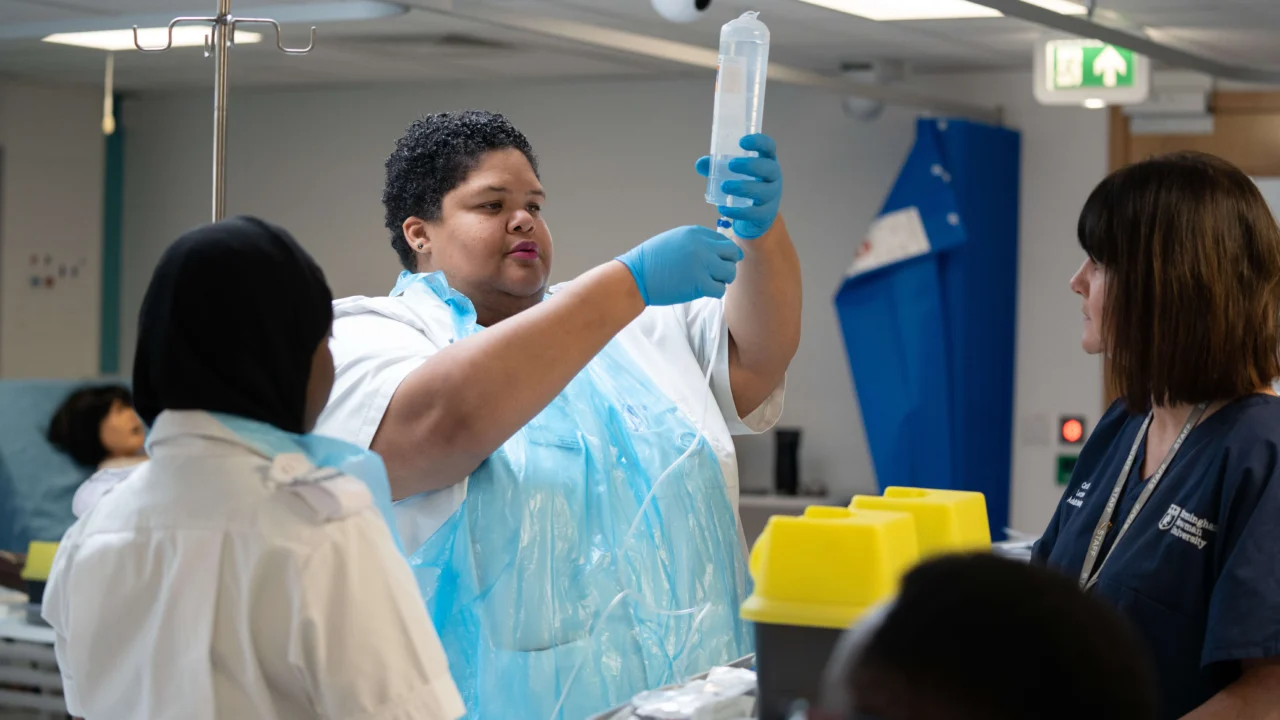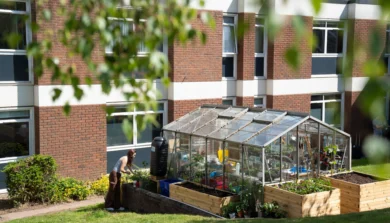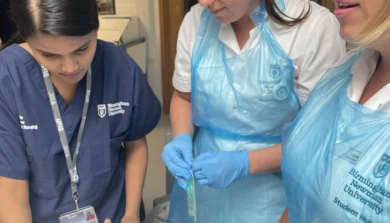MSc Adult Nursing
Postgraduate
- Start date
- –
- Study mode
- –
- Course length
- –
- UCAS Code
- –

Interested in a different start date?
This course is only open to UK applicants
Our programme
Our programme is developed in partnership with our skilled academic staff, clinical practice partners and experts by experience. The course at Birmingham Newman University, puts people at the centre of care delivery. As a postgraduate nursing student at Birmingham Newman you will develop into a professional nurse who can assess and manage the health needs of people, at some of the most challenging times of their lives.
Our aim is to support your development into a registered nurse who is able to work flexibly across a range of healthcare settings and meet the health needs of the whole person. We will work with you on your development to help you become a skilled, knowledgeable, emotionally intelligent nurse, able to lead and co-ordinate compassionate, evidence-based, person- and family-centred care while working as an integral member of the interdisciplinary team.
As a post graduate student nurse with Birmingham Newman University, you will gain theoretical and practice knowledge to develop a range of key skills. This will include: exploring the evidence that underpins person- and family-centred care; professional values; self-leadership; and the role of the registered nurse.
As you progress through the programme you will explore evidence-based complex care incorporating a wide range of research, skills, team leadership and principles of coordinating care. You will be supported to build on your previous learning and develop proficiency in adult nursing. The modules you study will develop you as a leader who uses research-informed critical thinking to co-ordinate care, supervise other health professionals and gain confidence in the safe management of medication.
You will have individual support throughout the programme through a named personal tutor. The tuition will enrich your learning experiences and will enable you to reflect meaningfully on your practice and the development of your individual field identity.
As part of the course you will be provided with practice placements to help you develop your nursing skills and knowledge in a variety of settings. Your placement learning experiences may be within community, hospital or home environment settings and at a location anywhere within the West Midlands and potentially into neighbouring counties. You should be aware that placements are valuable learning experiences and cannot be chosen. While on placement you will be supported, supervised and assessed by practice and academic staff to develop your knowledge and skills.
We are committed to providing excellent, innovative, learning, teaching and assessment experiences, through lectures, seminars, skills simulation, virtual learning as well as meaningful input from our practice partners and experts by experience. As part of the course we will enable you to develop the independent learning skills that will equip you for lifelong learning and future employment, as well as academic achievement.
Whilst on the course you will benefit from some of the best university facilities of their kind, including clinical skills suites and our state-of-the-art immersive suite. Our experienced and enthusiastic teaching team will provide full support to help you achieve your ambitions.
Why choose Birmingham Newman University
– Funding – Adult Nursing students will receive at least £5,000 a year in additional funding for maintenance and associated study costs – see NHS release. Mental Health Nursing students will receive at least £6,000 a year in additional funding for maintenance and associated study costs – see NHS release.
– You will benefit from our new state of the art clinical simulation and immersive suites.
– We offer smaller class sizes and excellent academic and pastoral support for our students
– You will have the opportunity to study on an inter professional basis alongside other nursing and allied health students.
– Birmingham is one of the UK’s most diverse cities outside of London, which provides you with a wide variety of experience that will be valuable to take forward into your future career.
– Student finance – have you already had a student loan to study an undergraduate degree but would like to do a post graduate degree in nursing, midwifery or the allied health professions. You may still be eligible for funding.

Got a question you’d like to ask?
Entry requirements
We welcome students from all backgrounds and accept a wide range of qualifications. If yours aren’t listed, don’t worry – our Admissions Team can help you explore your options. See full entry requirements.
A relevant honours degree, 2:2 or above, usually in a health-related subject.
Specific GCSE requirements:
GCSE/IGCSE English language and maths grades 9-4/A*-C or equivalent
If English is not your first language, you must have an IELTS score of 6.5, with no element below 6.0. (Other English language qualifications are also accepted. Please contact admissions for further information).
Consideration will be given to applicants with lower grade in qualifications (e.g. a 3rd class degree or non-honours degree) who have a relevant range of post study professional experience. Professional experience will be considered by the programme leader in conjunction with the quality office on an individual basis.
Non-Academic Requirements:
Success at Interview. The Admissions team will use the course entry requirements, as well as your personal statement, reference and any work experience information, to shortlist and invite successful candidates for interview. Candidates will be assessed at interview on their motivation and understanding of the role of a nurse and familiarity with the NHS Constitution and Values and the requirements of an NMC registered nurse.
Health checks. As part of the health clearance checks you will be required to provide information about your immunity and vaccination status. Candidates must prove they have been immunised against Rubella, Measles, Tuberculosis and Hepatitis B. We strongly recommend that all successful applicants (unless exempt on medical grounds) receive a full course of Covid-19 and Influenza vaccinations prior to commencing the course.
Occupational Health Clearance. Candidates must receive a satisfactory occupational health clearance prior to commencing the course.
DBS Clearance. Candidates must receive a satisfactory Disclosure and Barring System check prior to commencing the course.
Please contact Admissions if you have any questions.
Course fees
The tuition fee for academic year 2026/27 is: £9,790. Tuition fees for courses starting April to May 2026, fall within the 2025/26 academic cycle.
Fees for the 2025/26 academic year can be found on our Student Finance pages.
Additional costs
The University will review tuition fees and increase fees in line with any inflationary uplift as determined by the UK Government, if permitted by law or government policy, in subsequent years of your course. It is anticipated that such increases would be linked to RPI (the Retail Price Index excluding mortgage interest payments).
Check out our blog/news/events

Birmingham Newman Celebrates Green Week 2026 with Campus‑Wide Events
Birmingham Newman will host its annual Green Week from 23 to 27 February 2026, bringing…

Research that makes a difference: Mark Holland wins Most Impactful Project Award
In December, we held our Staff Awards, where we recognised the outstanding achievements of colleagues…

Sports Coaching students Deliver Coaching Sessions for Local Primary Pupils
Birmingham Newman University recently welcomed pupils from St Peter’s Primary School to campus as part…

Vice-Chancellor Professor Jackie Dunne awarded MBE in New Year Honours
Vice-Chancellor of Birmingham Newman University receives an MBE for services to Higher Education.

Birmingham Newman University Celebrates Staff Achievements at Annual Awards
Birmingham Newman University celebrates its staff at the Annual Staff Awards Celebration.

Book an open day
Find out about our next open day. Book now to secure your place.

Are you looking for a rewarding career that will help transform lives?
A career in nursing is challenging, satisfying and life-changing. As a nurse you can make a positive difference to people’s lives every day. Our person centred post graduate nursing degrees will equip you to deliver exceptional care as a confident, capable and compassionate adult nurse.
The importance of our healthcare workers and the role they play has never been so evident. Find out more and apply now for a career where there’s demand.
Additional Costs
DBS (Disclosure and Barring Service) clearance is a mandatory entry requirement for the course.
Courses we think you'll also like

MSc Mental Health Nursing
- Start date:
- April 2026

BSc Single Honours Adult Nursing (with Foundation Year)
- Start date:
- September 2026

BSc Single Honours Adult Nursing
- Start date:
- September 2026

MSc Applied Artificial Intelligence (AI) with Healthcare Innovation
- Start date:
- September 2026
